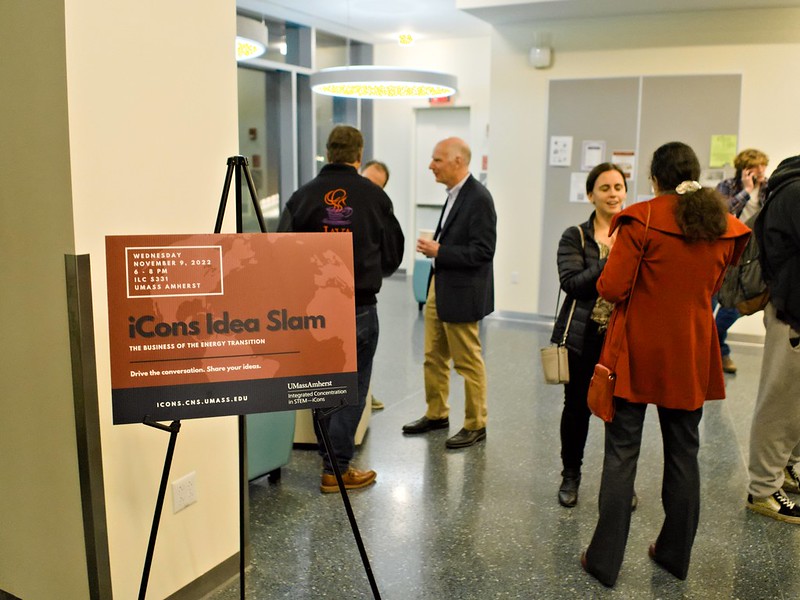On Nov. 9, the University of Massachusetts integrated concentrations in STEM program hosted the iCons Idea Slam, with the years topic being “the business of the energy transition.” Students discussed the detrimental impacts that climate change and fossil fuels have on our earth and ways to implement green solutions going forward.
Students came together to plan proposals for the many problems that industries are still struggling to solve. According to its page on the University’s website, iCons “recruits quality students across a diverse range of science, engineering, and business disciplines to identify global problems and find cutting edge solutions.”
Dr. Scott Auerbach, UMass chemistry professor and director of the iCons program, hosted the event in the Integrated Learning Center. During his opening remarks he said the meeting would be centered around pitching new ideas that were derived from questions asked by Tricia Canavan, CEO of Tech Foundry in the Western Mass Economic Development Council. Each team prepared a one-minute problem-solving pitch.
Panelists responded to student questions throughout the event. The panel included Dr. Mike Fogwill from Waters Corporation, Dr. Laura Draucker from Ceres Inc. and Dr. Anna Goldstein from Prime Coalition.
Providing context to the impact that climate change has on the planet, “80 percent of energy comes from burning fossil fuels and causes climate change, mountains of garbage and disease,” Auerbach said.
Before asking the first question, Canavan referenced the words of United Nations Secretary-General António Guterres who recently said, “We are on a highway to climate hell with our foot on the accelerator.”
Canavan asked the students to identify the problems regarding a specific situation she detailed. Florrent, a local company partnering with UMass, produces ultracapacitors that “provide the discharge speed to support demand during spike periods,” Canavan said.
Ultracapacitors are devices that store electric energy that can be rapidly released. According to their website, Florrent builds “high energy density ultracapacitors” for the adoption of “renewable energies, electrical vehicles, and net-zero buildings.”
Students were asked to analyze the use of Florrent’s ultracapacitors compared to other types of batteries, which are less expensive. In response, they discussed societal awareness and consumer involvement in the transition from hybrid to fully electrified energy systems.
When asked about switching from hybrid to a fully electric system of energy, Draucker responded that “we don’t have a choice” but to switch.
Canavan’s second question asked if Florrent will have a substantial positive impact on the transition to clean energy sources. Goldstein emphasized the importance of looking at the social and financial consequences of this shift before fully transitioning.
The topic shifted to the use of plant hemp as a source of energy, as Florrent manufactures their ultracapacitors from hemp biomasses. Alex Nichold, one of the founders of Florrent, said hemp agriculture “done right” does not create any waste product.
Panelists provided their own input on the alternative.
Goldstein noted her interest in using hemp as an alternative energy source. “That’s what I really like about Florrent’s solution, using hemp could be part of a regenerative agriculture system,” she said.
Drauker expressed his concern that there may not be enough land for the hemp industry, but highlighted its ability to create jobs.
“This switch will create jobs for those who will be losing their jobs from the fossil fuel industry…” Draucker said, in reference to completely transitioning to climate-friendly solutions and alternative energies. “It’s not just about money. You’re not going to survive, you’re not going to thrive if you don’t take these risks.”
Eva Maniatty can be reached at [email protected].



















